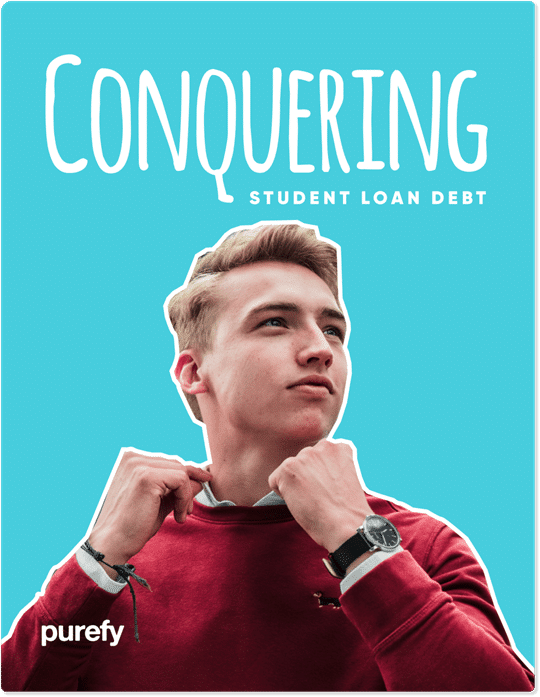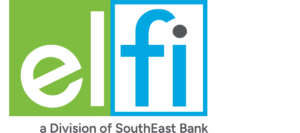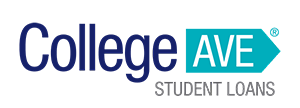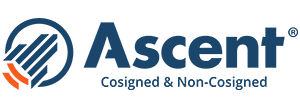If you are one of the people with student loans that make up the $1.64 trillion in total student loan debt, you may be looking at options to pay off your debt early. The average loan balance for someone with a bachelor’s degree is almost $30,000 and will take over 19 years to pay off — and for graduate degrees, it’s $66,000 and 23 years.
Here we take a deep dive to look at paying off student loans ahead of schedule to see where the pros and cons of paying off student loans early really makes sense for you and your lifestyle.
Benefits of paying off student loans early
Let’s face it — a lot of people are facing long-term repayment issues due to student loan debt. You may have one loan or several loans that you took out while in school that now have a monthly payment(s) due.
Student Loans can be a mix of both federal and private loans and may have different interest rates and terms — but every month, another payment is owed.
Paying off student loans early has some definite benefits. Let’s take a look at a few.
Saving on interest over the long-term
Interest is a necessary cost when you borrow money. You want to borrow money you don’t have to pay for things you want – in this case, your education.
Lenders, whether federal or private, charge a monthly fee for the use of their money and this adds up over time. As an example, if you have $20,000 in student loan debt and are paying 6% interest over a 10-year term, you will pay $6,645 in interest over the life of the loan.
By paying off your student loans early, you avoid paying interest. That saves you money over time and that money can be used for something else.
Putting money to work for your future
While your education is an investment in your future, you also want to generate long-term income, plan for your retirement, and increase your overall net worth. When you are paying student loan payments every month, that money is going to pay your debt service instead of being used to invest in longer term assets.
By paying off your student loans ahead of the original schedule, you have expendable income that can be redirected to an investment account or other growth vehicle.
Lowering your debt-to-income ratio to increase your buying power
Your overall buying power is directly related to your debt-to-income (DTI) ratio. If you owe an amount of money that causes your ratio to be too high, lenders will charge you increased interest rates or not loan to you at all.
That threshold is usually between 38% and 40%.
To figure your DTI is simple, just divide your total monthly debt payments by your gross monthly income. As an example, $1,950 in monthly debt payments (e.g., mortgage or rent, car payment, credit card payments) divided by $5,880 in gross monthly income equals .33 or 33%.
Lowering your monthly payments by paying off your student loans reduces your DTI and gives you more buying power for other big-ticket items, like a mortgage or car.
Reducing stress that may preclude you from making smart life choices
With extensive financial debt comes added stress. Your student loan debt may be keeping you from making important decisions. You may be putting off things like getting married, buying a home, or starting a business until you ‘get out of debt.’
By paying off your student loans early, you can ease your apprehension about important life decisions making it easier to accomplish things you may be postponing. Also, you can only benefit from reducing the toxic stress in your life!

Free eBook: How to Conquer Student Loans
Free eBook: How to Conquer Student Loans

Drawbacks of paying off student loans early
Sometimes, what sounds like a great idea turns out to be not so great in the final analysis. Consider these reasons why paying off your student loans may not work to your advantage over the long term.
Taking on higher interest to pay debt early
Keep in mind that taking on more interest just to pay off your debt earlier may not be your best guidance. Some people, eager to pay off their loans, may use a higher rate personal loan or personal lines of credit or credit cards to fund loan payoffs.
Student loans usually have interest rates lower than many credit cards or personal loans, so there is no advantage to swapping one rate for a higher rate. The only way this makes sense is when you refinance student loans to a lower rate through a private student loan refinance lender.
Jeopardizing your federal loan repayment options
If you have taken advantage of the various federal student loan repayment options, you may be limited in how you can restructure your personal debt. Public Service Loan Forgiveness and Income-Driven Repayment benefits are lost when you refinance your student loan to take advantage of a lower interest rate and/or shorter repayment term (such as a 5-year term).
Depending on your agreement, you may lose any cost savings afforded by these plans. For instance, if you are planning on a specific amount to be paid off based on loan forgiveness after 120 payments, you will be liable for the full amount if you withdraw from one of the federal repayment programs.
Losing tax advantages
Regardless of how much interest you pay, the maximum tax deduction for student loan repayment is $2,500 per year. You lose this tax advantage when paying off your loan early.
Depending on whether you itemize your personal tax returns or use the standard deduction can determine if this is a viable concern.
Using emergency funds to pay off student loan debt
Having six to 12 months of living expenses in liquid cash is a good financial plan. However, it may be tempting to use that money to pay off, or at least reduce, your student loan debt.
As 2020 demonstrated so succinctly, you never know when a situation may occur that requires the use of those funds, and it is better to keep them for such a circumstance rather than use them to pay off loans.
Sequencing loan payoffs — another consideration
We hear a lot from finance experts about paying off debt as soon as possible to improve your future financial life. And that may be true, but most of us don’t have the financial freedom to just pay off all our outstanding debt on a moment’s notice.
That’s why it’s better to look at your entire financial landscape before deciding which bills to pay off and which to refinance or find alternative payment options.
Try to think of it this way — there’s good debt and there’s bad debt.
Paying off bad debt first is the goal. Once you have paid the bad debt, then you can focus on the good debt.
So, what is bad debt?
Bad debt is when you are paying super high interest rates (like some credit cards and personal loans) or when you are paying on a depreciating asset such as a car or truck.
Good debt is when you are investing in something that produces a positive return, like a home mortgage, a business, or your education.
Let’s face it, no type of debt is optimal, but some leads to better financial circumstances in the long run or, more simply, is an investment in the future.
Here’s an example:
A person is looking at which loan to pay off sooner by making larger payments and must decide between these two scenarios:
Student Loan Debt $30,000
Interest Rate 5.4%
Monthly Payment for 10-yr Term $324.09
Total Interest Paid $8,891
Credit Card Debt $30,000
Interest Rate (Average) 16.4%
Monthly Payment for 10 Years $510.00
Total Interest Paid $31,205
In this situation, it’s definitely better to focus on paying off the credit card debt and refinancing or restructuring the student loan debt. You not only retire the larger monthly payment but end up paying much less in interest.
The 2 Best Companies to Refinance Student Loans
Our Top-Rated Picks for 2024 Offer Low Rates and No Fees

Best ways to pay off student loans early
Now that you’ve looked at the pros and cons and decided that you want to pay off your student loans, it’s important to develop a plan to meet your long-term goals by selecting a single solution or a combination of solutions.
Here are some ways to pay off student loans early:
Consider an employer that helps match student loans as a benefit
Employers have long understood that recruiting top talent means offering outstanding benefits along with an excellent salary. Effective recruiting methods today often include financial compensation to help to pay for student loans.
Companies as diverse as Estee Lauder, LiveNation, Aetna Insurance, and Fidelity Investments all match student loan payments for their full-time employees. Most have a lifetime maximum of $10,000 or sometimes more.
According to the Society of Human Resource Management, this employment benefit has become so popular that the number of companies offering loan repayment as part of their compensation package jumped from 8% to 34% between 2018 and 2021.
Make extra payments towards the principal
You can make extra payments or pay more on the principal usually with no penalties or fees for early payments (although you may want to check first to be absolutely sure your particular lender doesn’t have a pre-payment penalty).
Even paying an extra $100 or $200 with each monthly payment will pay off your loans more quickly and save on interest.
Another idea for people who get paid every two weeks is to make a payment with each paycheck. By the end of the year, you will have made 26 payments total. If a full payment each time is too much, think about paying the amount you can afford from your second monthly paycheck towards principal.
Pay windfalls towards your student loans
Sometimes they are unexpected, like an investment windfall or inheritance, and sometimes they can be expected like clockwork — bonuses or tax refunds. Wherever they come from, use those lump sums of money to pay towards your student loan principal.
They aren’t always something you can plan on or anticipate, but they can go a long way over time to pay down your student loans.
Consider a side hustle
Offering your services as an independent contractor is the new way to make extra money. According to a Zapier survey, 34% of Americans have a side hustle that earned them extra cash in 2021.
People are creating earning opportunities on everything from renting out spare rooms to freelance website development to delivering goods to consumers.
Today, technology has afforded us the ability to work from anywhere and whether you choose to work with a company that markets your services or to work independently, your earnings can go to pay off your student debt as fast as you choose to make it happen.
Refinancing your student loans
There’s good chance that your student loan debt is financed at an interest rate that was reasonable at the time, but now is much higher than you should be paying.
Today’s interest rates are at historic lows and refinance options could include opting for a lower interest rate and a shorter repayment term with you paying a bit more monthly than you are currently paying.
Let’s say you have student loans of $28,000 and are paying 7.2% over 9 years. That means that your monthly payment is $353 with a total interest paid of $10,126 over the life of the entire loan.
If you were to refinance the same $28,000 with an interest rate of 1.8% over 5 years, your payment would go up to $488, but it would be paid off in almost half the time and your total interest would be just $1,299.
See How Much You Can Save
View Details
Collapse
Step 3: See How Much You Can Save
$15,310
Lifetime Interest
Savings
$1,018
New Monthly
Payment
$128
Monthly
Savings
| Current Loan | New Loan | Savings | |
|---|---|---|---|
| Rate | 6.7% | 4.2% | 2.5% |
| Lifetime Interest | $37,520 | $22,210 | $15,310 |
| Monthly Payment | $1,146 | $1,018 | $128 |
Like what you see? Check your actual prequalified rates from the industry’s top lenders in just 2 minutes or less.
Who should pay off student loans early?
Federal student loan payments are suspended until January 31, 2022. This pause also instituted a 0% interest rate and stopped any collections efforts on loans in default. The U.S. Department of Education announced on August 6, 2021, that this is a final extension for the payment pause.
Once the payment pause ends, you will begin receiving statements and automatic debits will restart for federal loans. Most private loans have continued unchanged.
Why is this important? Because now is the time to decide how to structure your debt moving forward.
If you meet one of these criteria, you may be in a position to pay off your student loan debt early and then use your income for other things:
- Have a strong income where you could increase the number or amount of payments made towards paying off student loan debt.
- If you choose to work a side hustle to earn extra money, that income could go to repaying your loans.
- You can refinance your total student loan debt and choose terms that allow you to pay off the debt sooner.
Is paying off student loans a good idea?
If you look at when to pay off student loans early or if it’s a good idea, consider your personal financial situation. You don’t want to pay off loans early if it leaves you cash strapped.
Also, you may be waiting to see if the federal government moves forward on providing loan forgiveness for $10,000 to $50,000 as being discussed by the Biden administration. The answer is no one knows for sure. We do know that if a forgiveness program is instituted, it will impact federal loans only so keep that in mind.
Refinancing to payoff student loans early
It isn’t necessary to stay stuck with student loans for 10 years (or more). Refinancing lets you shorten your term and pay off debt faster — while saving money on interest. Today’s private lenders are offering record low interest rates, plus flexible terms so that you can craft a student loan payment plan that suits your needs and fits your lifestyle.
When you consider how to pay off student loans early, refinancing with a private lender may make the most sense. To successfully navigate the refinance process, you will need to have three things:
- A good credit score (>670)
- Strong, steady income
- A DTI of less than 38%.
If you have those three things, you are set to get a quote about refinancing your loans. If for some reason, you are lacking the credit history needed to score a great interest rate, you can always consider asking a cosigner (a parent, grandparent, or friend) if they are willing to help you refinance. Some lenders even allow a cosigner release once you have demonstrated superior repayment skills (usually after 12 months).
How to find the best quote when refinancing
Now comes the interesting part — how do you find the best refinance rates with so many different companies vying for your attention. One search on the internet and you can be overwhelmed with the number of options available, e.g., different interest rates, fixed vs variable options, etc.
Instead of the time-consuming research of visiting each lender and applying for their pre-approval quotes, Purefy offers a streamlined quote engine that brings together industry leaders offering the best interest rates and loan terms, as well as some interesting and innovative loan options, e.g. spouse refinancing options.
Purefy is dedicated to streamlining the process and presenting the top-tier of industry lenders who are all competing for your business in one easy process. Using the Purefy Rate Comparison Tool, you are able to share a few personal details that are encrypted and secure and receive a customized quote comparison listing the lenders where you qualify — and with no impact to your credit report and no fees or costs.
Once you have your prequalified rates, you can do a thorough comparison choosing the best interest rates and loan terms. Then it takes about 15 minutes to fill out the lender’s application and you will soon receive your loan approval results. It’s that simple.
What if you need more in-depth help?
This is where Purefy really excels! Voted Best Student Loan Refinancing Overall for the 2021 Best-of Awards through NerdWallet, Purefy has student loan experts available where you can schedule a free student loan refinance consultation.
These student loan advisors thoroughly understand the marketplace and are available for expert advice on how refinancing works and the benefits you can receive. Whether you need help with comparing rates or need a guide to walk you through the entire application process, Purefy’s advisors answer all your questions and support you as you negotiate the refinancing process.
To sum up
Should you pay off student loans early?
The answer is yes if you can manage the additional monthly costs through increased payments to principal, working a side gig, refinancing, or spending your annual tax refund on student loan debt.
Just be sure you aren’t harmed financially by the loss of federal loan repayment plans that you may have signed up for or using emergency funds to pay off debt.
By paying off your student loans early, you can put that money to work through investing, saving for retirement, or buying a house.
Talk with an expert at Purefy to learn more about the refinance process and how easy it is to get into the financial marketplace where private lenders will compete for your business. It’s never been easier to take advantage of the refinancing options available today and rates have never been lower.
If refinancing sounds like the best option for you, then try Purefy’s Compare Rates tool and get all the best options in one place.



















